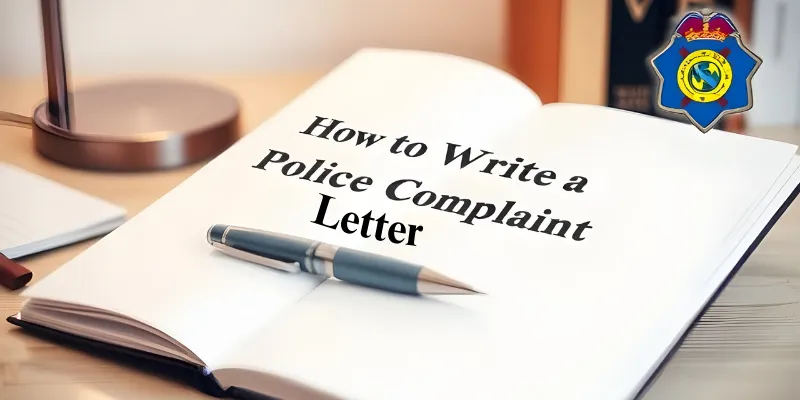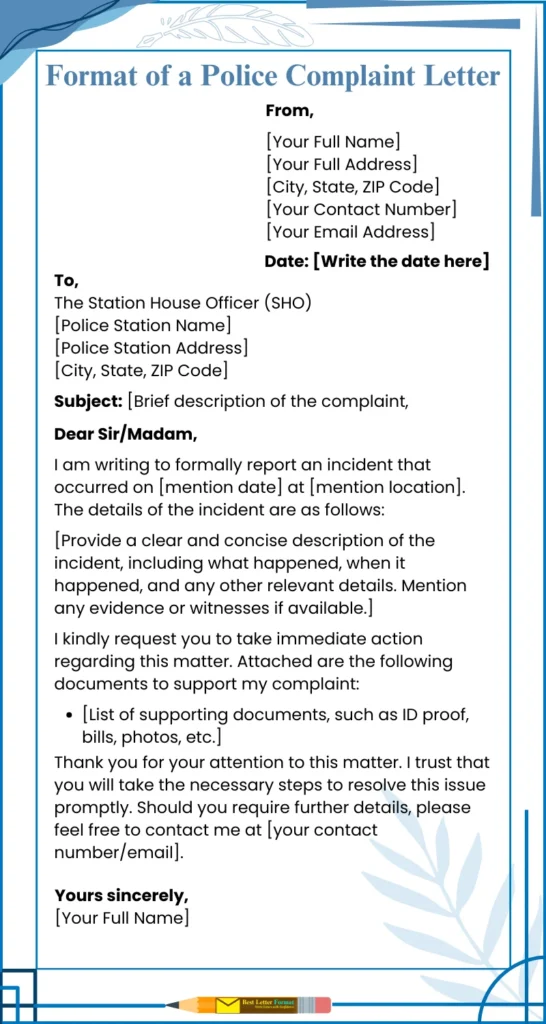Step-by-Step Guide to Writing a Police Complaint Letter with Examples
Published: 31 Dec 2024
Have you ever faced a situation where you needed to raise a complaint but didn’t know how to present it effectively? Writing a police complaint letter might seem challenging, but it’s a vital step that can help you get the justice you deserve. Don’t worry! In this article, we’ll guide you through an easy process to ensure your complaint is taken seriously and resolved. Whether it’s theft, threats, or any legal matter, you’ll find all the answers you need here.

So, let’s dive into the details and learn how to write a compelling police complaint letter step by step!
1. What is a Police Complaint Letter?
A police complaint letter is a formal way to report a problem or incident to the police. It provides details about what happened, when, and where, helping authorities understand the situation and take action. Whether it’s about theft, threats, or fraud, this letter ensures your concern is documented and addressed properly.
2. When Should You Write a Police Complaint Letter?
You should write a police complaint letter whenever you encounter an issue that requires police intervention. It’s essential to document the problem formally so it can be addressed effectively. Below are some common situations where writing a police complaint letter is necessary:
- Theft of Valuables: Whether it’s your mobile phone, Bike, car, or jewellery, reporting theft ensures police can act quickly.
- Harassment or Threats: If someone is threatening or harassing you, don’t hesitate to document the incident.
- Fraud or Scams: For financial fraud, online scams, or identity theft, a written complaint is critical for investigation.
- Domestic Violence: Seeking help against physical or emotional abuse starts with reporting it to the police.
- Public Disturbances: Complaints about excessive noise or illegal activities in your area should be reported formally.
- Missing Persons: Reporting a missing family member or acquaintance can help authorities start their search immediately.
- Workplace Issues: Cases of harassment or unethical behavior at work also warrant a formal complaint.
Writing this letter not only notifies the police but also provides an official record of the incident, which is crucial for legal or investigative purposes.
3. Types of Police Complaint Letters
Understanding the different types of police complaint letters can help you address your specific issue effectively. Each type focuses on a particular situation, ensuring that your concern is clear and actionable. Here are some common types:
- Complaint Against Theft
If your belongings like a bike, mobile, car, or jewellery are stolen, this letter helps initiate an investigation and recover your valuables. - Complaints about Harassment or Threats
When someone is threatening or harassing you, a written complaint ensures the authorities take your safety seriously. - Complaints about Fraud or Cheating
Cases like financial scams, online fraud, or identity theft require a formal report to help law enforcement track the perpetrators. - Complaint About Domestic Violence
If you or someone you know is experiencing abuse at home, this letter is the first step toward seeking legal protection. - Complaints about Noise or Public Disturbance
For issues like loud music, illegal gatherings, or activities disrupting public peace, writing a complaint can restore order. - Complaints about Missing Persons
If a loved one or acquaintance is missing, this letter ensures the authorities start their search promptly. - Complaints about Workplace Misconduct
Facing harassment or unethical practices at work? A formal complaint brings accountability and resolution. - Complaint About Cybercrime
For online scams, hacking, or any cyber threat, a complaint letter helps involve the cybercrime unit for swift action. - Complaint Against Police Misconduct
If you’ve experienced unfair treatment or abuse of power by police, this letter allows you to report the incident officially.
Each of these types ensures that your concern is addressed specifically and effectively, helping you take the first step toward resolving your issue.
4. How to Write a Police Complaint Letter?
Writing a police complaint letter doesn’t have to be complicated. By following a clear structure and including essential details, you can ensure your complaint is taken seriously. Here’s a step-by-step guide:
1. Start with Your Details
At the top of the letter, provide your personal information so the authorities can contact you if needed:
- Your Name: Full name for identification.
- Your Address: Include your complete address.
- Contact Information: Add your phone number and email address.
2. Add the Date
Include the date on which you’re writing the letter. This helps in keeping a record of when the complaint was made.
3. Address the Recipient
Write the recipient’s details next. Generally, this would be the officer in charge or the head of the local police station:
- Recipient’s Name/Designation: For example, “The Station House Officer.”
- Police Station Address: Mention the full address of the police station.
4. Write a Clear Subject Line
The subject should summarize your complaint briefly. For example:
Subject: Complaint Regarding Theft of Mobile Phone on [Date].
5. Begin with a Polite Salutation
Start with a formal greeting, such as:
Dear Sir/Madam,
6. State the Purpose Clearly
In the opening paragraph, explain why you’re writing the letter. Include essential details like:
- The nature of the incident (theft, harassment, fraud, etc.).
- The date, time, and location of the incident.
7. Provide Details of the Incident
In the body of the letter, describe the incident step by step:
- What happened?
- When and where did it happen?
- Who was involved (if known)?
- Mention any evidence or witnesses, if available.
8. Request Action
Politely request the police to take appropriate action. For example:
“I kindly request you to investigate the matter and take necessary steps to resolve it.”
9. Attach Supporting Documents
Mention any documents you are attaching to support your complaint:
- Copies of ID proof.
- Bills or invoices (in case of theft).
- Photos, videos, or any other evidence.
10. End with a Polite Closing
Thank the recipient for their time and efforts. For example:
“Thank you for your attention to this matter. I look forward to your prompt response.”
Close with:
Yours sincerely,
[Your Full Name]
5. Format of a Police Complaint Letter
Here’s a simple and beginner-friendly format for a police complaint letter that you can follow:
[Your Full Name]
[Your Full Address]
[City, State, ZIP Code]
[Your Contact Number]
[Your Email Address]
Date: [Write the date here]
To,
The Station House Officer (SHO)
[Police Station Name]
[Police Station Address]
[City, State, ZIP Code]
Subject: [Brief description of the complaint, e.g., “Complaint Regarding Theft of Mobile Phone on [Date]”]
Dear Sir/Madam,
I am writing to formally report an incident that occurred on [mention date] at [mention location]. The details of the incident are as follows:
[Provide a clear and concise description of the incident, including what happened, when it happened, and any other relevant details. Mention any evidence or witnesses if available.]
I kindly request you to take immediate action regarding this matter. Attached are the following documents to support my complaint:
- [List of supporting documents, such as ID proof, bills, photos, etc.]
Thank you for your attention to this matter. I trust that you will take the necessary steps to resolve this issue promptly. Should you require further details, please feel free to contact me at [your contact number/email].
Yours sincerely,
[Your Full Name]

6. Example of a Police Complaint Letter: Theft of Mobile Phone
Losing a mobile phone due to theft can be a stressful and frustrating experience, especially when it contains personal and valuable information. Reporting the theft through a formal police complaint letter ensures that the matter is documented and investigated promptly.
[Your Full Name]
[Your Full Address]
[City, State, ZIP Code]
[Your Contact Number]
[Your Email Address]
Date: [Write the date here]
To,
The Station House Officer (SHO)
[Police Station Name]
[Police Station Address]
[City, State, ZIP Code]
Subject: Complaint Regarding Theft of Mobile Phone on [Date]
Dear Sir/Madam,
I am writing to lodge a formal complaint about the theft of my mobile phone on [date] at approximately [time] near [location]. The incident occurred while I was walking through the area, and an unidentified individual snatched my phone and fled the scene.
The details of the stolen phone are as follows:
- Make and Model: [e.g., iPhone 12]
- IMEI Number: [Provide the IMEI number, if available]
- Approximate Value: [State the estimated value of the phone]
I kindly request you to register my complaint and initiate an investigation to recover my phone and bring the perpetrator to justice. Attached with this letter are the following documents to support my complaint:
- A copy of my ID proof.
- Purchase invoice of the stolen phone.
- A photograph of the device (if available).
Thank you for your time and attention. I trust that you will take prompt action to address this matter. Please feel free to contact me at [your contact number/email address] if further information is required.
Yours sincerely,
[Your Full Name]

7. Tips for Writing a Police Complaint Letter
Writing a police complaint letter effectively is crucial to ensure your issue is taken seriously and addressed promptly. These universal tips apply to any type of complaint, such as theft, fraud, harassment, or other incidents.
| Tips for Writing a Police Complaint Letter |
|---|
By following these tips, you can write an effective police complaint letter that ensures your concern is addressed promptly and professionally, regardless of the nature of the complaint. |
8. Common Mistakes to Avoid in a Police Complaint Letter
| Common Mistakes to Avoid |
|---|
Avoid these mistakes to ensure your police complaint letter is effective and professional. |
9. FAQs About Police Complaint Letters
Below are common questions people often have about writing and submitting police complaint letters, along with clear answers to help you navigate the process:
- A standard police complaint letter format includes:
- Your personal details (name, address, contact information).
- The recipient’s address (police station details).
- A brief subject line summarizing your complaint.
- A detailed description of the incident.
- A polite closing with a request for action.
- Start with your name, contact details, and date.
- Provide incident details, including what happened, when, and where.
- Attach evidence to support your complaint.
- End with a polite request for action or investigation.
Write in a formal tone, structure the letter with a clear introduction, body, and conclusion, and include all key details about the issue.
Its purpose is to formally notify law enforcement about a crime or problem, ensuring your concerns are documented and prompt action is taken.
To write a strong letter:
- Be clear and concise.
- Provide all essential details like date, time, and location.
- Attach supporting evidence.
- Use polite and respectful language.
Common complaints include:
- Theft (e.g., stolen property, mobile phones).
- Harassment (physical or verbal threats).
- Fraud (financial scams or identity theft).
- Domestic violence.
Supporting documents can include:
- A copy of your ID proof.
- Receipts or invoices (in theft cases).
- Photos or videos of the incident.
- Witness statements (if applicable).
Yes, many jurisdictions offer the option to file complaints online through their official websites or by email. Check your local police department’s process.
Avoid these mistakes:
- Using emotional or aggressive language.
- Providing vague or incomplete details.
- Forgetting to attach supporting evidence.
A verbal complaint is informal and may not be well-documented, while a written complaint creates an official record that is more likely to prompt action.
Conclusion
Writing a police complaint letter may seem like a big task, but it’s a straightforward process when you know what to include. Whether it’s theft, harassment, or any other issue, a well-written letter can help ensure your voice is heard.
Key points to remember:
- Be polite and explain the incident clearly.
- Include all the important details like date, time, and location.
- Attach supporting documents to back up your complaint.
Now it’s your turn! Have any tips or experiences about writing a complaint letter? Share them with us—we’d love to hear your story and learn from you. Your feedback could help others too!

- Be Respectful
- Stay Relevant
- Stay Positive
- True Feedback
- Encourage Discussion
- Avoid Spamming
- No Fake News
- Don't Copy-Paste
- No Personal Attacks

- Be Respectful
- Stay Relevant
- Stay Positive
- True Feedback
- Encourage Discussion
- Avoid Spamming
- No Fake News
- Don't Copy-Paste
- No Personal Attacks








